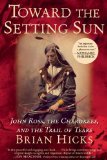
John Ross, the Cherokees and the Trail of Tears
by Brian Hicks
Toward the Setting Sun chronicles one of the most significant but least explored periods in American history, recounting the little known story of the first white man to champion the voiceless Native American cause.
The son of a Scottish trader and a quarter-Cherokee woman, Ross was educated in white schools and was only one-eighth Indian by blood. It was not until he was twenty-two, when he fought alongside "his people" against the Creek Indians, a neighboring rebel tribe, that he knew the Cherokees' fate would be his. As Cherokee chief for four decades in the early- to mid-nineteenth century, he would guide the tribe through its most turbulent period, at once civilizing it for a new era and furiously defending it from white encroachment. The Cherokees' plight lay at the epicenter of nearly all the key issues facing a young America: western expansion, states' rights, judicial power, and racial discrimination. Clashes between Ross and President Andrew Jackson raged over decades, from battlefields and meeting houses to the White House and Supreme Court. But Jackson began to methodically evacuate each of the other “Civilized Tribes” to land beyond the Mississippi River and felt no shame in ignoring decades of U.S.-Indian treaties. As increasing numbers of whites settled illegally on the Nation's native land, including Ross's beloved home at Head of Coosa, the chief remained steadfast in his refusal to sign a treaty agreeing to removal. Only when a group of renegade Cherokees betrayed their chief and negotiated an agreement with Jackson's men behind Ross's back was he forced to give way and begin his journey west.
In one of America's great tragedies, thousands of Cherokees died during the tribe's migration on the Trail of Tears, and the survivors who made it to Oklahoma were left to build a new life. Toward the Setting Sun retells the story of our nation's expansionist aspirations from the native perspective, and takes a critical look at the well-rehearsed story of American progress.
"Richly detailed and well-researched, this heartbreaking history unfolds like a political thriller with a deeply human side." - Publishers Weekly
"A vigorous account of the forced removal of the Cherokee people from their southern homelands ... [Hicks] takes a measured view of Ross's opponents and allies alike, shedding new light on the career of other eminent figures such as the newspaperman and Confederate general Stand Watie. A welcome addition to Cherokee history." - Kirkus
"Although Hicks does a great job of establishing and building up his information, he then seems to quit and simply bring the book to an end, leaving readers stranded." - Library Journal
"By focusing on the people behind the tragedy of the Cherokee and the Trail of Tears, Brian Hicks makes us see how individual men and women shaped the complex course of history. Written with sympathy and verve, Toward the Setting Sun is an important book that is also a pleasure to read." - Nathaniel Philbrick, author The Last Stand: Custer, Sitting Bull, and the Battle of the Little Bighorn and the National Book Award-winning In the Heart of the Sea
"In this powerful and engaging new book, Brian Hicks tells the compelling story of Chief John Ross and the tragedy of the Cherokee Nation. By focusing on the Ross family, Hicks brings narrative energy and original insight to a grim and important chapter of American life." - Jon Meacham, Pulitzer Prize-winning author of American Lion
"With careful probing and quiet eloquence, Brian Hicks shows us the moral complexities of a leader struggling to make sense of his shrinking world. You feel the fate of John Ross and the Cherokees, a great people whose only crime was living in the path of a ravenous, covetous empire." - Hampton Sides, author of Blood and Thunder
This information about Toward the Setting Sun was first featured
in "The BookBrowse Review" - BookBrowse's membership magazine, and in our weekly "Publishing This Week" newsletter. Publication information is for the USA, and (unless stated otherwise) represents the first print edition. The reviews are necessarily limited to those that were available to us ahead of publication. If you are the publisher or author and feel that they do not properly reflect the range of media opinion now available, send us a message with the mainstream reviews that you would like to see added.
Any "Author Information" displayed below reflects the author's biography at the time this particular book was published.




Information is the currency of democracy
Click Here to find out who said this, as well as discovering other famous literary quotes!
Your guide toexceptional books
BookBrowse seeks out and recommends the best in contemporary fiction and nonfiction—books that not only engage and entertain but also deepen our understanding of ourselves and the world around us.